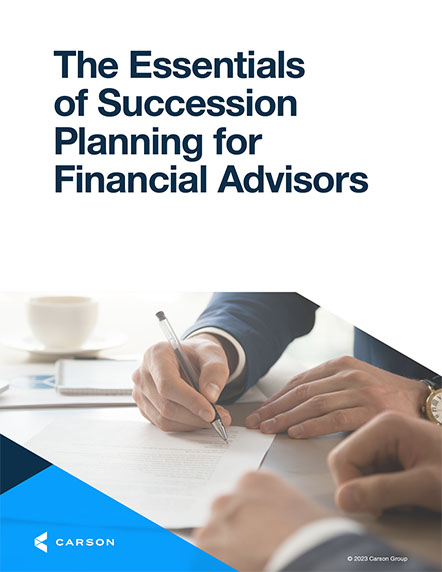When the pain of staying with your current broker-dealer far exceeds the pain of leaving, you know making a change is essential.
However, how prepared you are for this life-changing event is instrumental to its success. It’s true transitions are hard work, but if you keep the end goal in mind and consider best practices, you’ll align yourself on the track to success.
Before you decide to pull the trigger on a transition, preparedness is key. Having worked in this industry for more than 19 years, with the majority of that time in the recruiting department at a large independent broker-dealer, I’ve witnessed what it takes to make or break a firm’s transition. Here are my top tips to a successful transition.
Find the right fit
This may seem obvious, but believe it or not, it is one that is commonly disregarded by many. In order to have a successful transition, you need to first ask yourself if you are moving for the right reasons and if this firm really fits all of your needs. It shouldn’t be about the money or how fast you can get up and running. Due diligence is a two-way street, and any “right fit” firm will understand that.
Create a list of questions, ask for a B/D comparison and, more importantly, schedule onsite visits with your final top three choices. There is nothing more powerful than sitting face to face with your potential partner.
You should look at your next move as if it is going to be your last. Taking all steps to ensure it is a cultural and business fit should be at the top of your list. This isn’t a race and you shouldn’t take shortcuts. You need to make sure you find the right home for you, your clients and your internal stakeholders.
Ask for help!
Let’s face it, we all want to be the martyr, the superhero, the one who carries the load so others don’t feel the burden, but take a step back and think about that for a moment. Is that really in the best interest of your business, your clients, your internal stakeholders and your sanity to try and do it all yourself?
A transition is a team effort, and you need the right people in the right seats for it to be a success. Everyone wants a transition that is seamless, but it won’t happen if you don’t have help.
Realistically you need two teams:
- one at your business
- and one at the home office of your new partner.
A dedicated transition team is critical to the success of your transition, and if you put one in place, you will reap the benefits.
Have a plan
Benjamin Franklin said, “By failing to prepare, you are preparing to fail.” Those words couldn’t be truer when it comes to planning a transition. Poor planning will result in a decrease in revenue, damaged relationships and a significant loss of productivity.
Start by asking your new firm for a sample transition plan and build off of that. Be sure to include specific timeframes and deadlines, assign task managers, etc.
Don’t be afraid to ask questions before you get started. Hold yourself, your team and your new firm accountable to this plan. A well-thought-out and executed plan will put you on the fast track to revenue growth while strengthening the trust and relationships you’ve worked so hard to build.
Understand the cost
Transitions can be stressful enough – who wants to be surprised by hidden costs and fees? Don’t be distracted by large upfront dollars. Those can often come with handcuffs and disguise what you will really be paying. Understanding what a transition really costs is vital.
Sure you may be getting upfront dollars that appear to offset some transition costs, but do you really understand what you are signing? Here are some questions to ask yourself: Is the loan forgivable or non-forgivable? Are you locked in for a certain period of time? What happens if you don’t reach the required revenue marks? Are there tax consequences to receiving this money? What can you really use the money for? Is it in addition to other fee waivers, or are you on the hook for those?
Whether or not you are receiving upfront money, it is important to understand the real cost to you and your clients. A transition comes with expenses ranging from licensing and registration fees to platform costs/ticket charges to account transfer fees (especially if you are switching clearing platforms), etc. Obtain a list of fees from your potential partner and compare it to what you are currently paying. If you are offered any sort of incentive package, get every detail in writing. Once you understand the costs, ask your potential partner for an economic analysis.
A transition shouldn’t break the bank or put you in the hole. In the end, it’s about reducing client costs while increasing your revenue – a win-win for all parties.
Open the lines of communication
You can’t have a successful transition without open and consistent communication with your new partner. Before you begin the transition, make sure expectations are very clear when it comes roles, timelines, fees, etc. It’s also important to eliminate any gray area, especially as it relates to agreements, non-competes, outstanding loans, etc. This is an area where it’s imperative you understand the dos and don’ts.
During the transition, you should be having weekly calls with all parties involved – your internal stakeholders as well as the transition team at your new firm. Time is money, so have a set agenda for these weekly calls and hold everyone accountable. This is an opportunity to address and correct any challenges, obtain answers to any questions, discuss what’s going well and research areas of opportunity. Open communication ensures you are sticking to the plan and keeping the process running smoothly.
Transition is such a time of change – albeit positive change – for advisors that we don’t even call it transition at Carson Group, we call it transformation. Transformation really is a more accurate description of what happens when an advisory firm becomes a Partner; they transform their practice to better meet advisor, stakeholder and client needs and undergo a dramatic change in the process.
If you want your transformation to be a success, considering these five tips prior to making a move will help you get on the right track.
For advisor use only. Not intended for client distribution.



